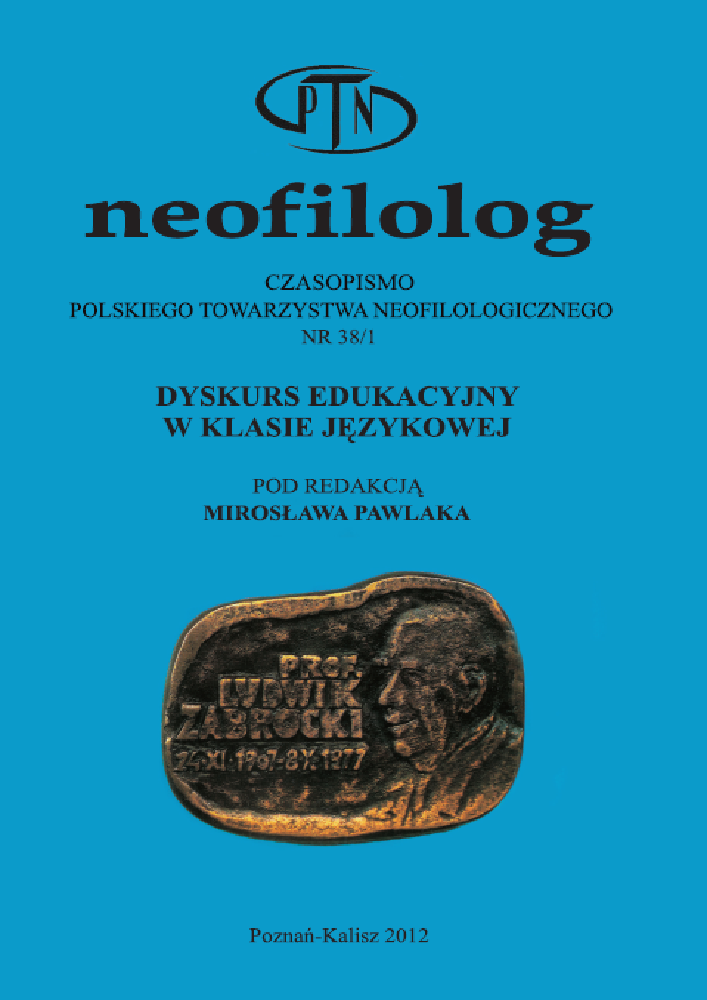Abstract
Despite its growing popularity within the humanities and social sciences, the concept of discourse (and also discourse analysis) continues to be perceived as rather vague by those who are not experts in the domain of discourse analysis. The aim of the present paper is to acquaint non-specialist readers with the multifold, interdisciplinary nature of discourse in order to further consider its usefulness with reference to foreign language pedagogy. It is argued that a wider use of this concept may lead us to a more coherent view of the main issues underlying our field, namely by integrating into our thinking both social and individual communicative practices. This idea is illustrated with selected conceptual tools and the views advanced by leading French discourse analysts (e.g. Charaudeau, 1993, 2010; Maingueneau, 1996, 2005) and, up to this point, mainly exploited in studying the media and public communication. Moreover, the importance of typological distinctions in foreign language pedagogy is stressed and an example of a discursive approach to foreign language instruction is provided. At the same time, attention is drawn to inherent and/or objective limitations on and difficulties in a wider use of the concept of discourse. These problems notwithstanding, the conclusion points to the fact that, given the complexity of our domain, it is hardly conceivable nowadays that we can be content with oversimplified formulae and limited, one-sided theories.
Literaturhinweise
Beacco, J.-Cl. 1996. „Linguistique de discours et enseignements de langues", [w:] Moirand, S. (red.). Le Français dans le Monde. Recherches et Applications, burner pec. Le discours: enjeux et perspectives. 183-192.
Charaudeau, P. 1992. „Sciences humaines, enseignement et culture" [w:] Le Français dans le Monde 253: 46-52.
Charaudeau, P. 1993. „Le discours de communication dans la situation de classe". [w:] Halte, J. F. (red.). Inter-Actions. Metz: Université de Metz. 121-135.
Charaudeau, P. 2010. „Pour une interdisciplinarité 'focalisée' dans les sciences humaines et sociales". Questions de Communication 17. (http://www.ques2com.fr/index.php?p=accueil&type=details&revue=51&id=51).
Duszak, A. i Fairclough, N. (red.). 2010. Krytyczna analiza dyskursu. Kraków: Universitas.
Council of Europe. 2001. Europejski system opisu kształcenia językowego: uczenie się, nauczanie, ocenianie. Warszawa: CODN.
Grzmil-Tylutki, H. 2010. Francuska lingwistyczna teoria dyskursu. Kraków: Universitas.
Górecka, J., Wilczyńska, W. i Wojciechowska, B. 2012. „Developing L2 oral competence through an integrated discursive approach: The conceptual framework of the project and the pilot study results", (w druku)
Kopaliński, W. 1995. Słownik wyrajów obcych i wyrażeń obcojęzycznych. Warszawa: Wiedza Powszechna.
Lizenz
Copyright (c) 2012 Weronika Wilczyńska

Dieses Werk steht unter der Lizenz Creative Commons Namensnennung - Keine Bearbeitungen 4.0 International.
Autoren:
Die Autoren der zur Veröffentlichung in der Zeitschrift Neofilolog angenommenen Texte sind verpflichtet, den Vertrag über die Erteilung einer kostenlosen Lizenz für die Werke mit der Verpflichtung zur Erteilung einer Sublizenz CC auszufüllen, zu unterzeichnen und an die Adresse der Redaktion zurückzusenden.
Gemäß Vertrag erteilen die Autoren auf die in der Zeitschrift Neofilolog veröffentlichten Texte der Adam-Mickiewicz-Universität in Poznań eine nicht exklusive und kostenlose Lizenz und erlauben die Verwendung der Sublizenz Creative Commons Attribution-NoDerivatives 4.0 International (CC BY-ND 4.0).
Die Autoren behalten das Recht zur weiteren freien Verfügung über das Werk.
Benutzer:
Interessierte Onlinebenutzer dürfen die seit 2017 veröffentlichten Werke unter folgenden Bedingungen nutzen:
- Anerkennung der Urheberschaft - die Verpflichtung, zusammen mit dem verbreiteten Werk Informationen über die Urheberschaft, den Titel, die Quelle (Links zum Originalwerk, DOI) und die Lizenz selbst bereitzustellen;
- ohne Schaffung abgeleiteter Werke - das Werk muss in seiner ursprünglichen Form erhalten bleiben, ohne Zustimmung des Autors dürfen keine Studien, beispielsweise Übersetzungen, verbreitet werden.
Die Urheberrechte aller veröffentlichen Texte sind vorbehalten.
Sonstige:
Die Adam-Mickiewicz-Universität in Poznań behält das Recht auf die Zeitschrift als Gesamtheit (Layout, Grafik, Titel, Umschlagsprojekt, Logo usw.).
